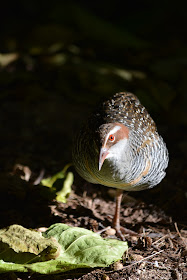As I mentioned in my last post, I have a new Nikon SLR, and I couldn't have wished for a lovelier place or more cooperative models to test it on than Heron Island and its wildlife, particularly the beautiful Eastern Reef Egrets.
Our guide told us that although they were once referred to as herons, they have been reclassified as egrets, and the name 'heron' is now only applied to species with more than one colour plumage. However, there are two distinct colour forms, the white and the grey (or blue), but they readily interbreed and both colours offspring can be found in the same brood.
Because the island is a reserve, the island birds are very laid back and seemed only too happy to pose with their beautiful island home as backdrop.
 |
| In a casuarina tree |
 |
| One of the other island residents, the Sacred Kingfisher |
 |
| Crested Tern landing on the gantry. These are visitors to the island along with boobies, cormorants, oystercatchers, frigate birds, flycatchers, and raptors, like the Australian Hobby that I saw but didn't manage to snap. They breed elsewhere but visit the island throughout the year. |
 |
| Silver gulls |
 |
| Buff Banded Land Rail - these birds have really adapted to living with humans: the restaurant was screened to keep them at bay! |
 |
| Pathway to the beach |
 |
| The green door - entrance to the Pisonia forest. |
 |
| Octopus Bush |
 |
| The flowers of the Octopus Bush inspire its name |
 |
| A cooperative couple strike a series of poses |
 |
| The University of Queensland's research centre |
 |
| White-Breasted Sea Eagle |
 |
| Bar Shouldered Dove |
 |
| The Sacred Kingfisher in a different location on the lookout for crabs |
 |
| Silver Eye |
 |
| Taking flight |
 |
| Blue Tiger butterfly on Octopus Bush |
 |
| Noddy Tern with old nest. During the breeding season between September and March, the population can reach between 70,000 and 120,000 |
 |
| I told you those rails have made themselves at home. Talk about the good life! |
Hope you enjoyed meeting Heron Island's wildlife and thanks for persevering with me. I am back to studying for a couple of months so have gone a little quiet on the blogging front, but I will be back with a vengeance come Spring and post when I can till then. Hopefully, my garden will forgive me.





































What lovely wildlife photos you have captured.....National Geographic would be more than happy to have you on board I'm sure.
ReplyDeleteEnjoyed this trip with you a whole lot.
Good luck with your studying, and give Onslow and Miss B some head rubs for me. Take care.
Thanks Virginia. It was a nice mini break and great chance to play with the new camera. The pups send their regards to Brownie.
DeleteWhat incredible photos! Sounds like a brilliant place... but those Pisonia are just downright creepy...
ReplyDeleteYep - the pisonia were interesting for sure, Michael. I'm glad I didn't see any birds trapped in the sticky seeds. It would be hard to leave them to their fate. I save butterflies and dragonflies from spiders webs here when I can.
DeleteWow, lovely pictures! Seems like you had a great trip :-)
ReplyDeleteGood luck with your studies!
It was a great trip, Helene, and thanks for the good wishes. It will be great to have the course over and done with in time to enjoy Spring in the garden here.
DeleteBeautiful shots! I think it is not the camera but the photographer who is good :-D
ReplyDeleteYou are very kind, Stephanie!
ReplyDelete